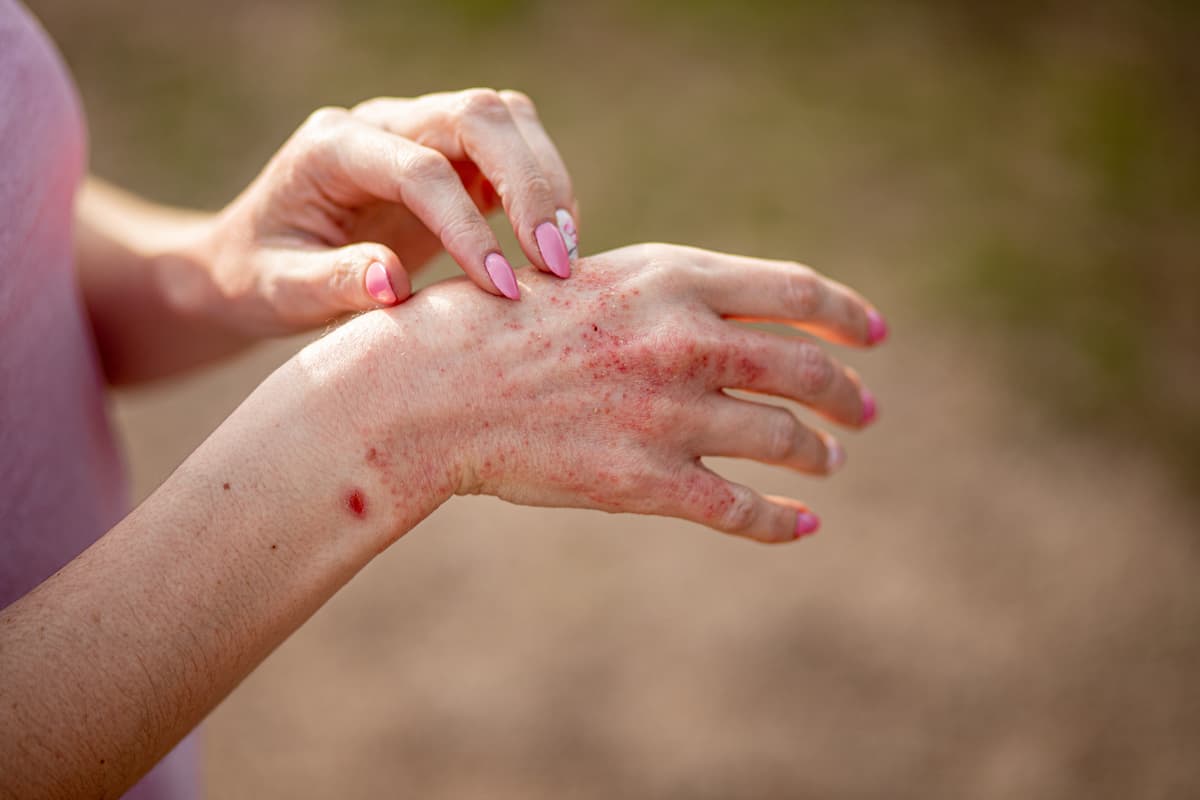- Center on Health Equity & Access
- Clinical
- Health Care Cost
- Health Care Delivery
- Insurance
- Policy
- Technology
- Value-Based Care
Lebrikizumab Improves Quality of Life, Disease Control in Patients With Atopic Dermatitis
Two studies explored the quality-of-life impacts of lebrikizumab for atopic dermatitis, finding its benefits extend beyond physical symptom improvements.
Teenagers taking lebrikizumab (Ebgylss; Lilly) for atopic dermatitis appeared to experience improvements in anxiety and depression symptoms as a result of their treatment, a new study found.1 The results align with a meta-analysis that suggests the therapy enhances disease control in many patients and improves quality of life.2
Both studies were presented as abstracts at the American Academy of Allergy, Asthma & Immunology/World Allergy Organization Joint Congress and published in the Journal of Allergy and Clinical Immunology.
Lebrikizumab improved quality of life and mental health in patients with atopic dermatitis in a pair of studies. | Image Credit: InfiniteStudio - stock.adobe.com

Approximately 1 in 10 children and 7% of adults in the United States experience atopic dermatitis, according to a 2017 report funded by the National Eczema Association.3 And while the most immediate impact is itchiness and discomfort, patients also experience a number of other adverse effects, including sleep disturbances, impairment of physical and social activity, and, in some cases, negative academic effects. A Norwegian study published in 2014 found that 15.5% of high schoolers with current eczema reported suicidal ideation, compared with 9.1% among students without eczema.4 They also found that students with eczema had a higher risk of mental health problems and that boys with eczema were less likely to have had a romantic relationship.
Lebrikizumab is a high-affinity immunoglobulin G4 monoclonal antibody designed to treat adolescents and adults with moderate-to-severe atopic dermatitis. It was approved last year by the Food and Drug Administration.5
In one of the new reports, Bob Geng, MD, of the Rady Children’s Hospital, and colleagues sought to understand how the new therapy might affect anxiety and depression among adolescents.1 They analyzed anxiety and depression scores for patients with moderate-to-severe atopic dermatitis who were enrolled in a phase 3 open-label study of lebrikizumab. The study involved 206 patients with a mean age of 14.6 years. The patients had experienced atopic dermatitis for an average of 12.4 years. A slight majority (52.4%) were female, and 53.9% of the cohort was from the United States.
The study used Patient-Reported Outcomes Information System (PROMIS) anxiety and depression scores to determine the therapy’s impact. They found that patients who began the trial with PROMIS scores at or above 60 (qualifying as moderate to severe) had an average of 19.0% improvement in PROMIS-anxiety scores and 12.6% improvement in PROMIS-depression scores after 52 weeks. Two-thirds of patients with moderate-to-severe PROMIS-anxiety scores and just over half of patients with moderate-to-severe PROMIS-depression scores at baseline improved to the mild category or better by week 52.
The second study took a broader look at the data in randomized controlled trials of lebrikizumab.2 Maria Luiza Castro, MD, of the Federal University of the State of Rio de Janeiro, Brazil, and colleagues found 7 trials that met inclusion criteria; they involved a total of 1770 patients. Overall, 48% of participants were female, and 61.9% of participants were randomized to receive lebrikizumab in their respective trials.
The investigators found the therapy improved atopic dermatitis severity compared with placebo, but they also saw improvement in a number of quality-of-life parameters. For instance, sleep loss improved for patients taking lebrikizumab compared with placebo (standardized mean difference [SMD] –0.46; 95% CI, –0.59 to –0.33; P < .00001), as did Dermatology Life Quality Index scores (SMD, –0.32; 95% CI, –0.46 to –0.18; P < .0001).
Castro and colleagues concluded that the benefits of lebrikizumab for patients with atopic dermatitis extend beyond the direct benefits of disease and also improve patients’ quality of life.
References
- Geng B, Mehta V, Paller A, et al. Lebrikizumab improves anxiety and depression symptoms of adolescents with moderate-to-severe atopic dermatitis: results from a 52-week, open-label, phase 3 study. J Allergy Clin Immunol. 2025;155(2)(Suppl):AB200. doi:10.1016/j.jaci.2024.12.620
- Moura MJ, Maggi B, Lima N, Grüdtner D, Castro ML. Efficacy and safety of lebrikizumab for moderate-to-severe atopic dermatitis: a systematic review and meta-analysis of randomized controlled trials. J Allergy Clin Immunol. 2025;155(2)(Suppl):AB222. doi:10.1016/j.jaci.2024.12.683
- Drucker AM, Wang AR, Li WQ, Sevetson E, Block JK, Qureshi AA. The Burden of Atopic Dermatitis: Summary of a Report for the National Eczema Association. J Invest Dermatol. 2017;137(1):26-30. doi:10.1016/j.jid.2016.07.012
- Halvorsen JA, Lien L, Dalgard F, Bjertness E, Stern RS. Suicidal ideation, mental health problems, and social function in adolescents with eczema: a population-based study. J Invest Dermatol. 2014;134(7):1847-1854. doi:10.1038/jid.2014.70
- McCormick B. FDA approves lebrikizumab for patients aged 12 and older with moderate to severe atopic dermatitis. The American Journal of Managed Care®. September 16, 2024. Acessed May 15, 2025. https://www.ajmc.com/view/fda-approves-lebrikizumab-for-patients-aged-12-and-older-with-moderate-to-severe-atopic-dermatitis
